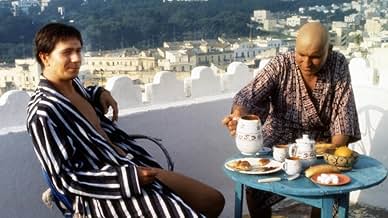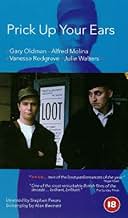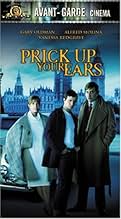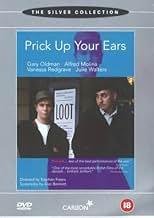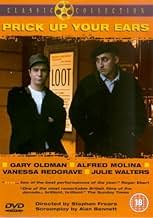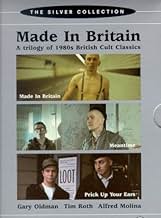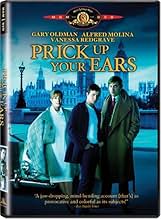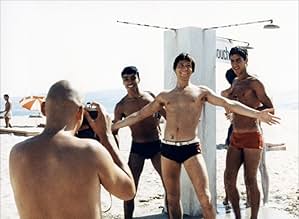CALIFICACIÓN DE IMDb
7.1/10
6.8 k
TU CALIFICACIÓN
El biógrafo John Lahr está escribiendo un libro sobre el dramaturgo Joe Orton.El biógrafo John Lahr está escribiendo un libro sobre el dramaturgo Joe Orton.El biógrafo John Lahr está escribiendo un libro sobre el dramaturgo Joe Orton.
- Dirección
- Guionistas
- Elenco
- Nominada a3premios BAFTA
- 5 premios ganados y 8 nominaciones en total
- Dirección
- Guionistas
- Todo el elenco y el equipo
- Producción, taquilla y más en IMDbPro
Opiniones destacadas
Before writing this I saw an interview with Kenneth Williams best known as being part of the Carry On troupe. He gave some interesting insights into Joe Orton and Kenneth Halliwell. As a gay man himself Williams experienced and felt the same things in the days before sodomy laws were repealed in the United Kingdom, considerably before they were in the USA. The pressures of living as a couple increased exponentially especially a May/August couple as Orton and Halliwell were.
Joe Orton whose work I'd like to see and is curiously unavailable is played by Gary Oldman and we see him as a young writer befriended and mentored by Kenneth Halliwell who is older and played by Alfred Molina. Williams says that in his opinion there is no doubt the influence that Halliwell had on Orton's work. But they were two very different types of personality and probably were fated to come apart. Especially when Halliwell who mentored Orton was not finding any success with his own writing. In the end it destroyed them.
Great Britain had some strict sodomy laws as Oscar Wilde was living testimony to. Gay artists however got different treatments depending on who their patrons were. Oscar Wilde and the Orton/Halliwell duo in their respective generations were treated one way. But Noel Coward moved at the highest levels of British society and he had a Teflon like immunity from what befell the other three.
The film is told in flashback with Vanessa Redgrave as Orton's agent telling his biographer Wallace Shawn what the two were about individually and separately. Both Oldman and Molina were brilliant.
I can't help thinking that if they could have been traditionally married back then, they could also have been traditionally divorced when the love faded. That certainly would have been better all around.
But then we would not have had this fascinating tragedy.
Joe Orton whose work I'd like to see and is curiously unavailable is played by Gary Oldman and we see him as a young writer befriended and mentored by Kenneth Halliwell who is older and played by Alfred Molina. Williams says that in his opinion there is no doubt the influence that Halliwell had on Orton's work. But they were two very different types of personality and probably were fated to come apart. Especially when Halliwell who mentored Orton was not finding any success with his own writing. In the end it destroyed them.
Great Britain had some strict sodomy laws as Oscar Wilde was living testimony to. Gay artists however got different treatments depending on who their patrons were. Oscar Wilde and the Orton/Halliwell duo in their respective generations were treated one way. But Noel Coward moved at the highest levels of British society and he had a Teflon like immunity from what befell the other three.
The film is told in flashback with Vanessa Redgrave as Orton's agent telling his biographer Wallace Shawn what the two were about individually and separately. Both Oldman and Molina were brilliant.
I can't help thinking that if they could have been traditionally married back then, they could also have been traditionally divorced when the love faded. That certainly would have been better all around.
But then we would not have had this fascinating tragedy.
Gary Oldman follows up his unknowable Sid Vicious in SID AND NANCY with an equally elusive Joe Orton in what is ultimately a riff on A STAR IS BORN. As Orton's star rises, that of his needier, more vulnerable lover Kenneth Halliwell, played with compassion by Alfred Molina, declines.
The screenplay, by Alan Bennett, is based on critic John Lahr's biography of Orton. Bennett makes the writing of the biography part of the story, and briefly tries to parallel the relationship of Lahr and his wife Andrea (played by Wallace Shawn and Lindsay Duncan), but I'm not sure that it helps the film much. Splitting the story's focus in its early sections removes us from Orton himself. That's who we want to stay with. The only real benefit the Lahr section gives us is one wonderful scene between Ms Duncan and the great Joan Sanderson as her hyper-middle class mother, decoding shorthand sections of Orton's diary to reveal highly salacious behaviour. Ms Sanderson's deadpan performance, enthusiastically uncovering Orton's meaning while remaining steadfastly unshocked, is one of the highlights of the film for me.
There are a dozen or so cameos from other wondrous actors, mostly known for their theatre work -- Margaret Tyzack, John Moffatt, Julie Legrand, Selina Cadell -- as well as substantial support from Francis Barber and Janet Dale as, respectively, Orton's warm-hearted sister and eccentric landlady.
Ultimately, the film rests on the shoulders of the central trio: Orton, Halliwell and Orton's agent, the redoubtable Peggy Ramsay. She is played by Vanessa Redgrave in a glowing performance, that helps to hold the disparate parts of the film together.
Molina's work I've already praised. So we're back to Gary Oldman, who is absolutely brilliant as Orton. What Oldman is able to do is to accept, rather than explain, his characters. He thinks it's OK not to make them totally knowable, and he's right.
Director Stephen Frears is equally difficult to pigeon-hole. He favours realism on the one hand, but on the other he is capable of pulling off highly-charged scenes - like the orgy in a public lavatory -- which might floor less gifted artists.
All in all, an entertaining and informative film, not without its flaws. In particular, its depiction of gay men's lives in the late fifties and early sixties is interestingly honest.
The screenplay, by Alan Bennett, is based on critic John Lahr's biography of Orton. Bennett makes the writing of the biography part of the story, and briefly tries to parallel the relationship of Lahr and his wife Andrea (played by Wallace Shawn and Lindsay Duncan), but I'm not sure that it helps the film much. Splitting the story's focus in its early sections removes us from Orton himself. That's who we want to stay with. The only real benefit the Lahr section gives us is one wonderful scene between Ms Duncan and the great Joan Sanderson as her hyper-middle class mother, decoding shorthand sections of Orton's diary to reveal highly salacious behaviour. Ms Sanderson's deadpan performance, enthusiastically uncovering Orton's meaning while remaining steadfastly unshocked, is one of the highlights of the film for me.
There are a dozen or so cameos from other wondrous actors, mostly known for their theatre work -- Margaret Tyzack, John Moffatt, Julie Legrand, Selina Cadell -- as well as substantial support from Francis Barber and Janet Dale as, respectively, Orton's warm-hearted sister and eccentric landlady.
Ultimately, the film rests on the shoulders of the central trio: Orton, Halliwell and Orton's agent, the redoubtable Peggy Ramsay. She is played by Vanessa Redgrave in a glowing performance, that helps to hold the disparate parts of the film together.
Molina's work I've already praised. So we're back to Gary Oldman, who is absolutely brilliant as Orton. What Oldman is able to do is to accept, rather than explain, his characters. He thinks it's OK not to make them totally knowable, and he's right.
Director Stephen Frears is equally difficult to pigeon-hole. He favours realism on the one hand, but on the other he is capable of pulling off highly-charged scenes - like the orgy in a public lavatory -- which might floor less gifted artists.
All in all, an entertaining and informative film, not without its flaws. In particular, its depiction of gay men's lives in the late fifties and early sixties is interestingly honest.
I caught this on cable today. Had never noticed it before which is odd since I've actively tried to be aware of movies with a strong gay component for as long as I can remember. But, be that as it may this is one that somehow slipped past me until today. After watching it in awe I checked to see when it was made thinking that surely it was something made in the recent past few years, after 2000. Certainly, I thought, it must have come out during the "Queer as Folk" era which gave filmmakers permission to finally and honestly show parts of the gay world which, unless you're a part of that world, most of the rest of the world were relatively unaware of until somewhat recently as society has changed for the better in its well reasoned acceptance of gays. Yet, instead, I found that "Prick Up Your Ears" was released in 1987. I couldn't believe it. The movie was so well done. Not only did it portray something that was way ahead of its time with regards to portraying this type of subject matter, the movie itself is so modernly made. The way it was filmed and the actors and how they are acting, everything about this movie screams "I'm way ahead of my time"! And so it is. And what you find is a beautifully made movie about the effects that society's attitude towards gays in the 50's and 60's have upon two gay men, their union, and gays in general during that time. And the movie was made two decades ago, breaking ground in ways that only now that movie audiences have come to take for granted.
This is a marvelous movie, groundbreaking when it was made, about an author and the authors life-partner who were breaking new ground themselves in their day. Everything about this movie is worth seeing. The story presented, the acting, the sets, the locations. Everything. In fact, it reaches far enough into so many different things about writing and movie making and gays and society and relationships and life and death itself, and it does it so well, that one can reasonably say that if you're a student of film this is a movie that should belong on your list of movies to see and study along the way to making your own movies. And if you're a person who loves good movies, this is also required viewing. And if you're gay, well, it will thrill you to see this movie for so many reasons that only if you're gay would you really kind of understand. And if you're just somebody who wants to pass some time watching a minor cinema masterpiece that has stood the test of time, here is one for you to watch, enjoy and be educated by too. Its just a part of who we were. I miss poor Joe and Kenneth.
This is a marvelous movie, groundbreaking when it was made, about an author and the authors life-partner who were breaking new ground themselves in their day. Everything about this movie is worth seeing. The story presented, the acting, the sets, the locations. Everything. In fact, it reaches far enough into so many different things about writing and movie making and gays and society and relationships and life and death itself, and it does it so well, that one can reasonably say that if you're a student of film this is a movie that should belong on your list of movies to see and study along the way to making your own movies. And if you're a person who loves good movies, this is also required viewing. And if you're gay, well, it will thrill you to see this movie for so many reasons that only if you're gay would you really kind of understand. And if you're just somebody who wants to pass some time watching a minor cinema masterpiece that has stood the test of time, here is one for you to watch, enjoy and be educated by too. Its just a part of who we were. I miss poor Joe and Kenneth.
Gary Oldman plays real life British 60's sensation Joe Orton, the author of "Entertaining Mr. Sloane". His performance, for me, goes at the very core of a gallery of real life characters who run the gamut from A to Z and then some. From Sid Vicious to Ludwig Van Beethoven, from Lee Harvey Oswald to Joe Orton and in 2017 Winston Churchill - not to mention fictional literary characters like Count Dracula. With Joe Orton, Gary Oldman reaches some kind of mountain top. He finds innocence in this emotional and sexual misfit and he projects Orton's genius with a profound flawed humanity. His tragic lover is played by another extraordinary actor, Alfred Molina - I've just seen him in "Feud" playing Robert Aldrich with such virtuosity that I have developed a personal relationship with Aldrich as if I knew him personally. Oldman and Molina create something we've never seen before and Stephen Frears know exactly how to capture it. As if this wasn't enough, Vanessa Redgrave play's Orton's agent. Even if you've never heard of Joe Orton, do yourself a favor, venture into this dark and human universe.
Its films like these that make you wonder why stars like Gary Oldman(Immortal Beloved) and Alfred Molina(Boogie Nights) aren't noticed as much as the awful actors that plague our screens(see Mark Wahlberg or Ray Liotta).
Prick Up Your Ears is a wonderful film about the writer Joe Orton(Oldman) and his lover Kenneth(Molina). The dialogue is smart and the acting is incredible. Rating=4/5
In addition, I would just like to say that teenagers can enjoy decent films. I was twelve when I watched this, and I found it amazing. Its the film that sparked off my fascination with Gary Oldman films.
Prick Up Your Ears is a wonderful film about the writer Joe Orton(Oldman) and his lover Kenneth(Molina). The dialogue is smart and the acting is incredible. Rating=4/5
In addition, I would just like to say that teenagers can enjoy decent films. I was twelve when I watched this, and I found it amazing. Its the film that sparked off my fascination with Gary Oldman films.
¿Sabías que…?
- TriviaAs well as being an actor, Wallace Shawn (John Lahr) is an acclaimed playwright and screenwriter. Until her 1991 death, his theatrical agent was Margaret Ramsay, who was also Joe Orton's agent, and is portrayed in this movie by Dame Vanessa Redgrave.
- ErroresWhen Joe's agent first meets him in 1964, she asks him how he's been supporting himself. He tells her he's on public assistance, getting £3.10 per week. New pence weren't introduced until 1971. However, in the pre-decimal era, "Three pounds ten" would have been understood as "Three pounds and ten shillings", the present-day equivalent being £3.50. For example, "Maggie Mae", recorded by the Beatles in 1969 but based on a much older traditional song, includes the line "Two pounds ten a week, that was my pay."
- Citas
[Halliwell puts his hand on Orton's leg. Orton brushes it off]
Joe Orton: No. Have a wank.
Kenneth Halliwell: Have a wank? Have a wank? I can't just have a wank. I need three days' notice to have a wank. You can just stand there and do it. Me, it's like organizing D-Day. Forces have to be assembled, magazines bought, the past dredged for some suitably unsavoury episode, the dog-eared thought of which can still produce a faint flicker of desire! Have a wank, it'd be easier to raise the Titanic.
Selecciones populares
Inicia sesión para calificar y agrega a la lista de videos para obtener recomendaciones personalizadas
- How long is Prick Up Your Ears?Con tecnología de Alexa
Detalles
- Fecha de lanzamiento
- País de origen
- Idioma
- También se conoce como
- Das stürmische Leben des Joe Orton
- Locaciones de filmación
- Productoras
- Ver más créditos de la compañía en IMDbPro
Taquilla
- Total en EE. UU. y Canadá
- USD 1,654,743
- Fin de semana de estreno en EE. UU. y Canadá
- USD 38,643
- 19 abr 1987
- Total a nivel mundial
- USD 1,672,927
Contribuir a esta página
Sugiere una edición o agrega el contenido que falta


